Clinical trials are an essential component of the drug development process. They provide critical data on the safety and efficacy of new drugs before they are approved for use by regulatory bodies. However, traditional clinical trials have limitations, including limited patient populations, strict inclusion and exclusion criteria, and controlled study conditions that may not reflect real-world settings.
Real-world evidence (RWE) is a term used to describe data collected from real-world sources, such as electronic health records, claims data, and patient-generated data. RWE can provide valuable insights into how drugs perform in real-world settings, beyond the controlled conditions of traditional clinical trials.
One of the primary benefits of RWE is that it can help to address the limitations of traditional clinical trials. For example, RWE can provide data on patient populations that are often underrepresented in clinical trials, such as elderly patients, those with comorbidities, and those taking multiple medications. This can help to improve the generalizability of trial results and ensure that drugs are safe and effective for a broader range of patients.
RWE can also provide data on how drugs perform in real-world settings, including how they are used, how they are dosed, and how they interact with other medications. This can help to identify potential safety concerns and drug interactions that may not have been identified in traditional clinical trials. It can also provide insights into how drugs perform over the long term, beyond the limited follow-up periods of most clinical trials.
Another benefit of RWE is that it can be collected more efficiently and at a lower cost than traditional clinical trial data. RWE can be collected from existing sources, such as electronic health records and claims data, without the need for additional study visits or data collection efforts. This can help to reduce the cost and time required for clinical trials, potentially accelerating the drug development process and bringing new treatments to market more quickly.
However, there are also challenges associated with the use of RWE in clinical trials. One of the primary challenges is ensuring the quality and accuracy of the data. RWE is often collected for purposes other than research, such as billing or clinical documentation, and may not be standardized or collected in a manner suitable for research purposes. As a result, careful attention must be paid to data quality and validation to ensure that the results of RWE studies are reliable.
Another challenge is ensuring the privacy and confidentiality of patient data. RWE often includes sensitive patient information, and strict privacy and security protocols must be in place to protect this data. This can include de-identification of patient data, data sharing agreements, and secure data storage and transmission protocols.
Despite these challenges, the use of RWE in clinical trials is becoming increasingly important. Regulatory bodies, such as the US Food and Drug Administration (FDA), are recognizing the value of RWE and are developing guidelines for its use in drug development. For example, the FDA's Real-World Evidence Program aims to facilitate the use of RWE in regulatory decision-making, while also ensuring the quality and reliability of the data.
Overall, the use of RWE in clinical trials has the potential to revolutionize the drug development process. By providing insights into how drugs perform in real-world settings, RWE can improve the generalizability of trial results, identify potential safety concerns, and accelerate the drug development process. While there are challenges to overcome, the benefits of RWE are clear, and its use in clinical trials and data management is likely to become increasingly widespread in the years to come.
